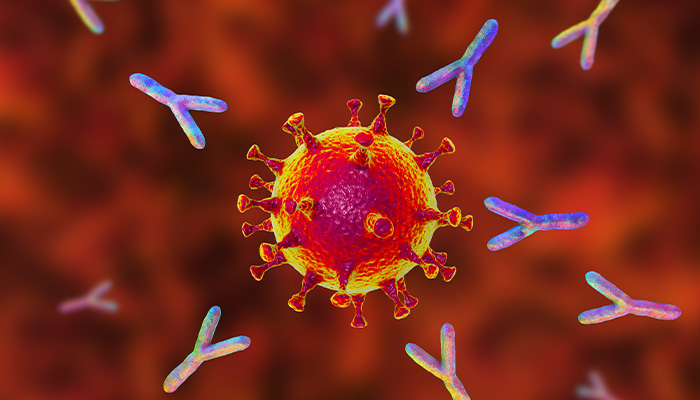HOW CAN WE HELP YOU? Call 1-800-TRY-CHOP
In This Section
Do COVID-19 Vaccines Offer More Protection for Pregnant People Than Infection?

Image shows antibodies attacking SARS-CoV-2 virus.
The findings:
Researchers at Children’s Hospital of Philadelphia and the Department of Microbiology in the Perelman School of Medicine at the University of Pennsylvania found that pregnant people who received mRNA COVID-19 vaccines had antibody levels 10-times higher than those who were naturally infected with SARS-CoV-2. Also, they detected immunoglobulin G (IgG) antibodies to SARS-CoV-2 were in the cord blood from more than 95% of newborns when mothers had antibodies. The results suggest that time from infection or vaccination to delivery was the most important factor in the efficiency of transfer ratio — the extent to which the antibody levels in the cord blood match or exceed the antibody levels in the mother.
Why it matters:
Currently, COVID-19 vaccination is recommended during pregnancy, as pregnant people are at an increased risk of severe SARS-CoV-2 infection. Pregnancy is associated with an increased risk of mechanical ventilation, intensive care unit admission, and death from COVID-19. Having COVID-19 during pregnancy may also be a factor in increased risk of stillbirth and complications, such as preeclampsia, preterm birth, and neonatal intensive care unit admission.

Dustin Flannery, DO, MSCE
Who conducted the study:
Among the CHOP researchers was first author Dustin Flannery, DO, MSCE, an attending neonatologist at CHOP and core faculty member in Clinical Futures, a CHOP Research Institute Center of Emphasis. Clinical Futures colleague and senior author was Karen Puopolo, MD, PhD, chief of the Section on Newborn Medicine at Pennsylvania Hospital. Collaborators from the University of Pennsylvania, led by microbiologist Scott Hensley, PhD, performed the antibody assays.
How they did it:
Researchers conducted the study at Pennsylvania Hospital in Philadelphia and included births between Aug. 9, 2020, and April 25, 2021, where maternal and cord blood serum samples were available for antibody level measurements. A total of 585 maternal-newborn dyads with maternal IgG antibodies to SARS-CoV-2 detected were included. Of the 585 pregnancies, they identified 169 individuals who had been vaccinated but never infected and 408 who had been infected but not vaccinated.
In a retrospective review of electronic health records, the study team collected demographic and clinical data, including timing of SARS-CoV-2 exposures and symptoms, SARS-CoV-2 nasopharyngeal polymerase chain reaction (PCR) test results, vaccine type and dates of administration.
Quick thoughts:
“These findings suggest that COVID-19 vaccination not only provides robust protection for mothers during pregnancy — it also provides higher concentrations of antibodies to babies than infection,” Dr. Flannery said. “Given that pregnancy is a risk factor for severe COVID-19, this study suggests pregnant people should prioritize getting vaccinated to protect themselves and their babies.”

Karen Puopolo, MD, PhD
Dr. Puopolo added that the study findings indicate the importance of appropriate timing of vaccine administration.
“Our study suggests that time from infection or vaccination to delivery was the most important factor in transfer efficiency, and these findings can inform optimal COVID-19 vaccination strategy during pregnancy,” Dr. Puopolo said. “Patients should plan to get vaccinated with ample time before their due date, so that they — and their babies — can benefit from a robust immune response.”
Where the study was published:
The study appeared in JAMA Network Open.


